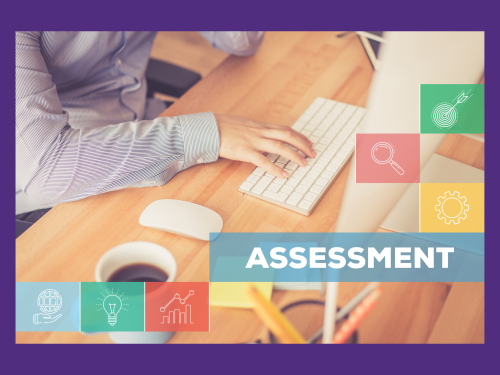
Assessment & Evaluation
NOTE: For more comprehensive information on the topics presented on this page, refer to Module 3: Course Alignment and Assessment, in the Principles of Online Course Design Workshop, developed by the St. Kate's Academic Technology team. All instructors are strongly encouraged to enroll in the workshop.
Student Learning Outcomes
Alignment of Student Learning Outcomes - Learn about the importance of ensuring your student learning outcomes align with both your course and program outcomes by reading this page from the Principles of Online Course Design workshop.
Creating Meaningful Student Learning Outcomes - Writing meaningful student learning outcomes is not as easy as it might seem. Especially if you are new to teaching, this resource from the Principles of Online Course Design workshop provides information on understanding the characteristics of a good learning outcome, as well as guidance on writing them using Bloom’s Taxonomy and the ABC method.
Assessment Resources in Canvas
If you have been teaching in Canvas, you are likely aware that Canvas has built-in assessment features, such as quizzes and rubrics, which allow for greater transparency and speed in grading.
There is an additional feature in Canvas called Outcomes, which allows you to track student learning outcomes separate from their grade in the course or on a particular assignment. You can implement at the course level, but several areas have also leveraged Outcomes to track program-level outcomes as well. This is part of a university-wide initiative to enhance assessment practices across St. Kate’s.
At the University level, the Writing Intensive Program, the Library (Information Literacy outcomes), and CORE, in conjunction with the Office of Scholarly Engagement, all have outcomes that may be a part of courses you teach, and your own program may have its program outcomes they want you to assess in your course. Check with your program chair or other academic leadership to see if the course you teach is a part of this growing initiative.
Canvas Outcomes Resources
- Guide to Adding Outcomes to Rubrics in Canvas
- Add a rubric to an assignment
- Align an outcome to a quiz question in New Quizzes
- Align an outcome to a quiz in New Quizzes
- View all aligned items and artifacts within an outcome
- View the outcomes results report for individual students in a course
- View outcomes results using the Learning Mastery Gradebook
Assessment Basics
Assessment Methodologies and Types - Learn how to align assessments with learning outcomes and master formative and summative methods for comprehensive student evaluation.
Assessment Techniques - Discover how to select the best assessment methods to accurately measure student achievement and enhance engagement.
Instructional Strategies - Discover how to seamlessly connect your course outcomes and assessments with engaging instructional strategies. Learn to design impactful, low-stakes activities that truly prepare students for major course evaluations.
Assessment Measurement - Master effective assessment measurement with our guide to crafting powerful rubrics and multiple-choice questions. Learn best practices for creating clear criteria, defining performance levels, and designing unbiased, insightful evaluations that truly assess student learning.
Aligning Learning Objectives to Types of Assessment - This handy table, based on Bloom's Taxonomy, shows you exactly what assessment types and measures best match each level of cognitive performance. Design clearer, more impactful evaluations and ensure your students are truly demonstrating their understanding.
Assessment Lead Toolkit
The Assessment Lead Toolkit involves many activities: Collecting data, reviewing data, and then using the feedback and results to improve student learning, ensure course and curriculum alignment, revise or replace assessment measures, plan, and budget, develop an improvement plan, and conduct program review. The Assessment Committee has created and curated resources to assist you in this process in the attached ATLAS Program Assessment Toolkit. The goal of program assessment is always to ensure student learning and improve departmental programs. It also ensures that we conform to best practices across higher education and meet the requirements of the Higher Learning Commission for the assessment of curricular and co-curricular learning outcomes. We hope this toolkit is helpful to Assessment Leads, Program Chairs, or whomever is tasked with the assessment process in their current role.